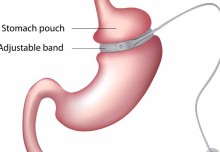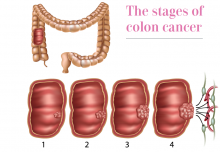Staying healthy may be partly helped by your genes. But even those who pick the genetically best parents can improve their chances of good health. Here are 5 of my favorite health tips to help you stay well in the new year.
- Eat Slow So Your Belly Fat Won’t Grow
Remember your mother saying, “Chew your food?” The new mantra is, “Chew your food slowly.” A study from Japan followed nearly 530 men over 8 years and found those who ate faster gained an average of 4.2 pounds during the study, compared with slower eaters who gained only1.5 pounds. That’s because your stomach needs 20 minutes to release the hormones that tell your brain how full you are. The yogis call this eating mindfully. Don’t just eat it; experience it! To slow yourself down, eat with friends or family and have a discussion. Watching TV doesn’t seem to help; those who do tend to eat more. Sipping water between each bite of a meal and putting your fork down between bites are also helpful ways to eat less. And it’s better for your digestion. As Yogi Bhajan use to say, “There are no teeth in your stomach.” - Be A Musician To Avoid Your Physician
When I started playing and writing music as a kid, I didn’t realize it would help keep my mind sharp. But if you can’t remember where you parked your car, it might be time to pick up a guitar—and a recent study suggests that if you don’t play an instrument already, now is the time to start. A University of Kansas Medical Center study showed that people who had played music for a decade or more had the best memory and cognition, which included memory, attention and language functions. Playing music involves so many areas of your brain that even practicing is beneficial.The researchers tested cognition in 70 adults aged 60 to 83. Those who had played the longest scored best, followed by the shorter-term players, and lastly, the non-musicians. In this study, the musicians had learned to play by age 10, Brenda Hanna-Pladdy, Ph.D., the study’s co-author felt that all the practicing needed to learn an instrument might have reorganized the younger brains and that the same process will happen as we age and need extra reserves to ward of dementia. - Standing Tall Makes Pains Small
Here’s another bit of wisdom you can learn from yoga. Curling into a ball is not as good as standing tall when you are about to experience a discomfort, like getting a painful shot. A study in the Journal of Experimental Social Psychology showed that assuming a dominant yoga pose, which involves standing tall and taking up more space rather than a submissive pose where the person kneels or constricts their body allowed people to endure more pain. Acting dominant may release more testosterone to combat the pain you otherwise would feel. Find more yoga tips in A Woman’s Book of Yoga. - Family History of Cancer? Know the Answer!
According to the American Cancer Society, having any family member with cancer, even extended family, substantially increased a person’s risk of getting cancer between the ages of 30 of 50. So if Aunt Jane had ovarian, colon or breast cancer, screen yourself for these earlier than the usual recommended times. - Walk When You Fly
Airplanes today are a very confining experience; knees bent, body scrunched up and difficult to get past the person sitting next to you. But sitting in a cramped position for hours on end, especially on longer trips, will increase your risk of a deep vein thrombosis (DVT) also called a blood clot. A Dutch research group asked the employees of three international companies whether or not they had a DVT in the four weeks after they flew for at least four hours. Compared to non-traveling employees, the frequent flyers were 3.65 times more likely to develop a DVT, and the risk increased if they flew more than once in the four-week window. The risk of developing a clot on a flight was 1 in 5944 flights. I suggest getting up every 20 to 30 minutes and walking down the aisle. It could save your life.





